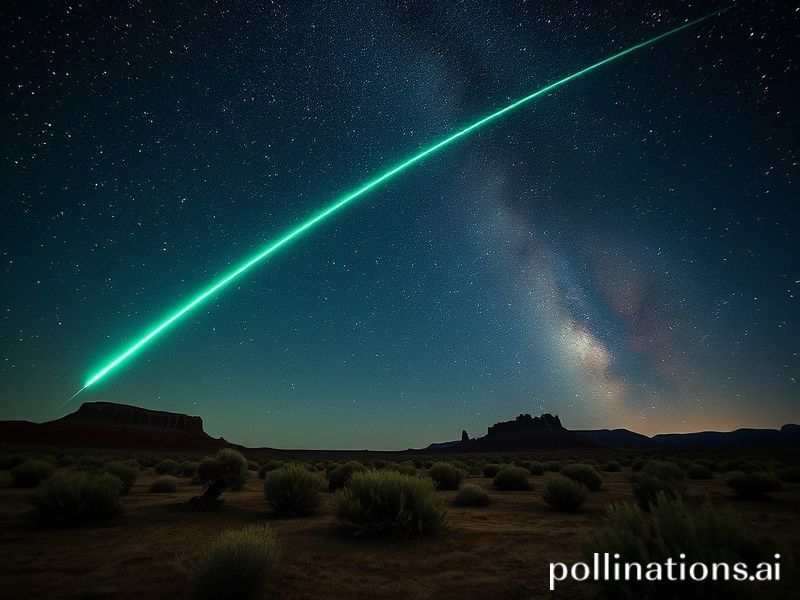Global Fireball Frenzy: How One Tiny Meteor Unmasked Earth’s Cosmic Insecurity
Meteoric Pretensions: When Space Rocks Remind Earthlings They’re Just Renters
Byline: Geneva, 3:17 a.m.—because cosmic indifference keeps no office hours.
Somewhere above the Sea of Okhotsk on Tuesday night, a fist-sized shard of primordial rubble clocked in at 56,000 km/h, lit the sky like a bad fire-sale neon sign, and expired in a puff of stratospheric self-importance. Witnesses from Hokkaido to Vladivostok uploaded videos that looked suspiciously like every other “meteor” clip since 2007—same teal-green bloom, same shaky zoom, same off-camera grandmother muttering that the end is nigh. Within minutes, #Fireball was trending in four languages, three of which still can’t agree on how to pronounce “GIF.” The object itself was no bigger than a washing machine, but the global reaction was predictably outsized: a reminder that when the universe tosses us cosmic confetti, humanity responds like wedding guests who’ve mistaken it for the buffet.
The international implications, if one enjoys stretching metaphors the way hedge-fund managers stretch ethics, are considerable. NORAD issued a polite shrug; the Russian defense ministry blamed “unplanned atmospheric research,” code for “we have no idea, but saying so is bad for quarterly morale.” Meanwhile, the European Space Agency issued a press release reminding citizens that its upcoming NEO-monitoring budget is still only 0.0003 % of what Europeans spend annually on artisanal cheese. China’s state media ran a 90-second segment praising the “stability” of Chinese skies, conveniently omitting that their own early-warning satellites were down for routine ideological maintenance.
Down on Earth, markets reacted with characteristic hysteria. Shares in obscure asteroid-mining start-ups—most of which have yet to mine anything beyond investor wallets—spiked 11 % before closing flat. Cryptocurrency enthusiasts insisted the meteor’s trajectory resembled a bullish Dogecoin chart, a claim disputed by astrophysicists and anyone with eyes. In Davos, a panel titled “Space Debris as Geopolitical Risk” served champagne flutes labeled “Carbon Negative” while attendees privately wondered if the real threat was that the universe might foreclose on us before their second homes in Gstaad fully appreciate.
The broader significance, stripped of TED-talk gloss, is that Earth remains a sublet with no security deposit. Our planetary insurance policy currently consists of a half-dozen underfunded telescopes and Bruce Willis on retainer. The UN Office for Outer Space Affairs—whose acronym, UNOOSA, sounds like a sigh in bureaucratic Esperanto—estimates that only 30 % of city-killer-sized objects have been catalogued. The other 70 % are presumably waiting for a more dramatic entrance, perhaps timed to coincide with a G7 summit or a Kardashian wedding.
And yet, humanity’s reflex remains endearingly performative. Tokyo’s governor called for “sky patrols,” apparently unaware that meteors do not respect municipal ordinances. A Florida congressman demanded NASA develop a “laser shield,” presumably between golf rounds. Over in Brussels, the EU proposed a joint planetary-defense fund, to be financed by a tax on memes—progressive, but doomed once the French realize they’ll have to declare half their cultural output.
In the end, the meteor did what all uninvited guests do: left without saying goodbye, and took nothing but our composure. The videos loop, the think-pieces multiply, and somewhere an algorithm is already selling meteor-shaped bath bombs. By next week we’ll have moved on to the next existential scare—climate tipping points, AI sentience, or the return of low-rise jeans.
But for one brief, incandescent moment, the planet looked up together, remembered we’re all on the same doomed rock, and then immediately resumed arguing about whose rock it is. The universe, unimpressed, chalked up another near-miss and scheduled the next reminder for a date TBD. Until then, keep your phone charged: the afterglow is lovely, but the comments section is eternal.







